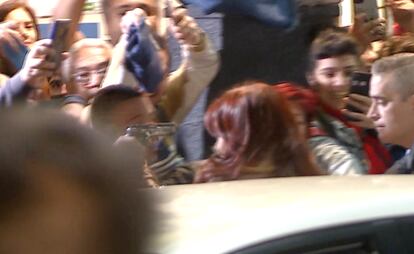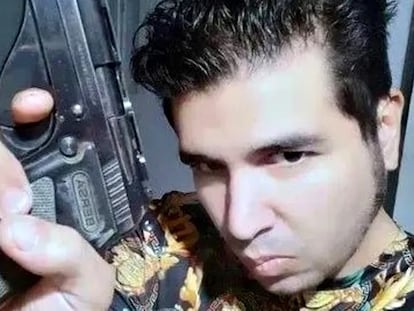A year after gun attack against Argentina’s Cristina Kirchner, no political ties have been found
Three individuals are set to stand trial over the failed hit of September 1, 2022. The vice president’s team claims there were other people involved in an incident that shook the foundations of Argentinean democracy at a delicate moment

On September 1, 2022, a man pointed a gun at the head of Cristina Fernández de Kirchner. The weapon failed to fire. The attack that put Argentina’s democracy on the ropes took place outside the vice president’s house and was recorded on a video that went around the world. A Brazilian national named Fernando Sabag Montiel, then 35, had infiltrated the crowd of Kirchner supporters gathered around their leader during the final stretch of the first trial she was facing for corruption. Sabag approached her as she got out of the car and pulled the trigger, but the plan failed and he was arrested. A year later, Kirchner remains silent and Argentina awaits the start of the trial against the three defendants: Sabag Montiel, his girlfriend Brenda Uliarte and Nicolás Carrizo, who employed the couple as street vendors. Sabag Montiel maintains that he acted alone. The vice president, on the contrary, suspects that there is someone behind it and has stated that the judicial investigation “was characterized by an aversion to learn the truth.”
“I feel that I am alive because of God and the Virgin Mary,” Kirchner said after the attack. She said that she realized Sabag Montiel had intended to kill her when she arrived home and saw the images repeated in a loop on television screens and cell phones across a shocked country.
For the former president (2007-2015), the most serious thing about the assassination attempt was that it “broke a social agreement that had existed since 1983,” when Argentina left behind the bloodiest dictatorship in its history. “I feel that the recovery of democracy was not only about being able to vote again or elect our authorities. Recovering democracy was also about recovering life and rationality, the ability to discuss politics,” she added.
The attack occurred at a time of maximum political tension in Argentina. Days earlier, federal prosecutor Diego Luciani had accused Kirchner of being the head of the largest corruption scheme ever known in the country. The statement was tied to an investigation into Kirchner for allegedly defrauding the State in the execution of roadworks in the Patagonian province of Santa Cruz, the cradle of Kirchnerism, and for which months later she was sentenced to six years in prison. “I am facing a judicial media firing squad,” the former president responded to the prosecutor’s accusations. Dozens of supporters then began a vigil in front of her home as a sign of support.
The tense mood was also reflected in the reaction to the attack on the most important political leader of recent decades in Argentina. The majority of the political class condemned it and highlighted how serious it was for Argentinean democracy. But among the exceptions were individuals who today lead the two main opposition bids for president in the October 22 election: the ultraliberal Javier Milei and the conservative Patricia Bullrich. Instead of a message of repudiation, Bullrich’s first response was to criticize the holiday decreed for the following day. “The president is playing with fire: instead of investigating a serious incident, she accuses the opposition and the media, and decrees a national holiday to mobilize supporters. It turns an act of individual violence into a political move,” she tweeted.
Milei opted for silence, although only a day earlier he had expressed solidarity with Jair Bolsonaro after the attempted attack he suffered during a motorcade.
Opposition supporters even spread the theory that it was a toy weapon and that the attack had been faked to divert attention from the judicial cases affecting the vice president. But the case shocked a large part of Argentinean society and the next day there was a massive demonstration against violence and the attack on democracy perpetrated just as the country was approaching the 40th anniversary of the end of the dictatorship.
Awaiting trial
The case, classified as premeditated homicide, is expected to go to trial. The first hypotheses linked Sabag Montiel with the Federal Revolution, a far-right group that criticizes Kirchnerist politicians and has called for anti-government demonstrations with torches and wooden guillotines. However, the only three individuals prosecuted to date are Sabag Montiel, his girlfriend Uliarte and their employer Carrizo. All three are known in Argentina as the ‘banda de los copitos’ for having been cotton candy sellers before their arrest.
Kirchner’s team insists that it is necessary to expand the radius of action and search for possible intellectual authors and financial backers of the attack. It has asked the Justice Department to investigate the alleged links between the accused and their neighbor Ximena de Tezanos Pinto, as well as the journalist Delfina Wagner. Previously, Kirchner also targeted Congressman Gerardo Milman, of the opposition coalition Together for Change headed by Bullrich, claiming political ties to the attack. A year later, the prosecution has found no evidence to support this hypothesis.
Sign up for our weekly newsletter to get more English-language news coverage from EL PAÍS USA Edition








































